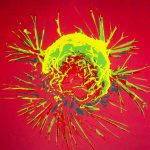Definition
noun
(1) Fluid through which cellular components of blood, lymph, or intramuscular fluid are suspended
(2) (medicine) Acellular, sterilized blood plasma that is used for transfusion
Supplement
The blood is the circulating fluid with the suspended formed elements, such as red blood cells, white blood cells and platelets in the vascular system of humans and other vertebrates. It is pumped throughout the body by the heart. It appears bright-red when the hemoglobin in the red blood cells is oxygenated. A mammalian blood is comprised typically of 55% plasma and 45% cellular elements (blood cells and platelets).
Plasma is the yellowish fluid in blood. It consists chiefly of water (about 95% by volume). Other components include dissolved proteins (e.g. serum albumins, globulins, fibrinogen), glucose, clotting factors, electrolytes, hormones, carbon dioxide, and oxygen.
In humans, plasma serves as a medium to transport essential substances in blood. It holds the cellular elements and as such serves as the extracellular matrix of the blood cells. It is a component of the extracellular fluid.
In medicine, the plasma refers to the sterilized blood plasma. It is devoid of the cellular elements of the blood. It is used for transfusions.
Word origin: Greekplassein (“to mold”)
See also:
- blood
- electrolyte
- serum
- extracellular fluid
Related term(s):









